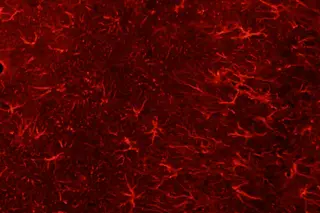Some of the common words we use are frozen mistakes. The term influenza comes from the Italian word meaning “influence”—an allusion to the influence the stars were once believed to have on our health. European explorers searching for an alternate route to India ended up in the New World and uncomprehendingly dubbed its inhabitants Indios, or Indians. Neuroscientists have a frozen mistake of their own, and it is a spectacular blunder. In the mid-1800s researchers discovered cells in the brain that are not like neurons (the presumed active players of the brain) and called them glia, the Greek word for “glue.” Even though the brain contains about a trillion glia — 10 times as many as there are neurons — the assumption was that those cells were nothing more than a support system. Today we know the name could not be more wrong.
Glia, in fact, are busy multitaskers, guiding ...















